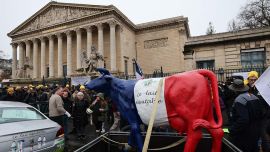Javier Milei's government plans to move forward soon with the privatisation of Argentina’s train and rail network, with the president seeking to "remove the state from the economy.”
Confirmation of the railway sell-off was provided by Argentina’s new Infrastructure minister, Guillermo Ferraro, who said that the aim is for the private sector to be in charge of the main transport services by the end of Milei’s term in office.
Asked about the libertarian leader’s intention to privatise the railways, Ferraro replied: "Yes, of course. Our orientation is: whatever the private sector can do, let it do it, and remove the state from the economy. That is the vector we are working with. What happens is that there are different ways of doing it and different railway activities and industries.”
"One thing is the railway that transports passengers and another is the freight railway. And then there is also a structure that was created in the 1990s. When they were privatised, they tried to bring in the European model, whereby a company was created to manage the infrastructure and another one to manage the railway operation," he recalled.
The official explained that "this was planned, as well as a system called 'open access,' but it was never implemented.”
“The tracks are in the charge of a company that charges a fee to those who use them," he explained in relation to Milei’s possible privatisation model.
Regarding Argentina’s current model, that brings together firms that manage the railways and their operation, Ferraro warned that "today everything is mixed up and on top of these two structures, companies of companies were created, and on top of that a mother company called Ferrocarriles Argentinos.”
He lamented: “All that is on top is bureaucracy that has been created in a useless way and that makes the whole system more expensive.”
Ferraro also confirmed that a package of measures will be sent to Congress soon, issued at the same time as a series of government decrees to "deregulate the economy.”
"Yes, next week is going to be a week of regulatory and legislative novelties,” said the La Libertad Avanza government official. “There is a package that we can call 'deregulation of economic activity' and there is another that has to do with the reform of the state.”
He explained that "in both cases they tend to free up and reduce the cost of the state and remove obstacles both produced by the state and within economic activity.”
“There are some that are linked to making it easier for the private sector to be the most dynamic factor in public investment, especially in infrastructure works,” said Ferraro.
– TIMES/NA




















Comments